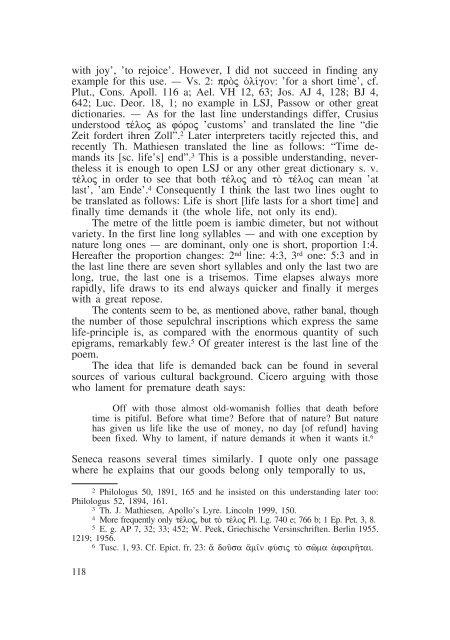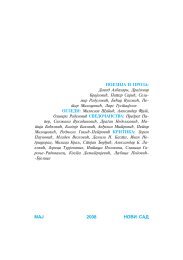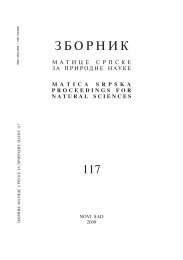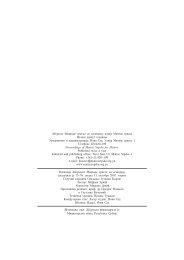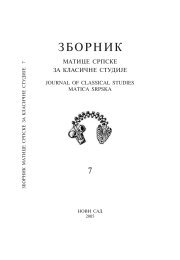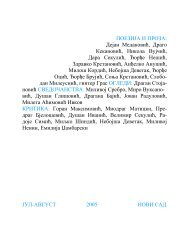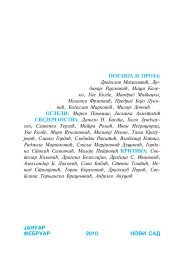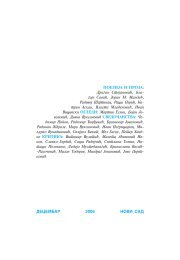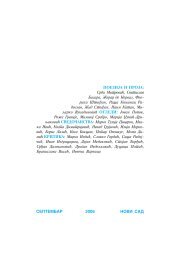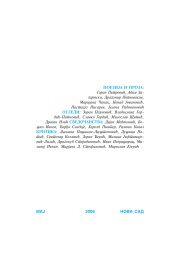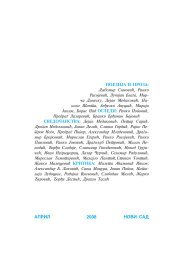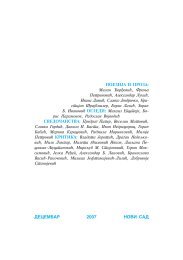You also want an ePaper? Increase the reach of your titles
YUMPU automatically turns print PDFs into web optimized ePapers that Google loves.
with joy', 'to rejoice'. However, I did not succeed in finding any<br />
example for this use. — Vs. 2: ���� ������: 'for a short time', cf.<br />
Plut., Cons. Apoll. 116 a; Ael. VH 12, 63; Jos. AJ 4, 128; BJ 4,<br />
642; Luc. Deor. 18, 1; no example in LSJ, Passow or other great<br />
dictionaries. — As for the last line understandings differ, Crusius<br />
understood ����� as ����� 'customs' and translated the line “die<br />
Zeit fordert ihren Zoll". 2 Later interpreters tacitly rejected this, and<br />
recently Th. Mathiesen translated the line as follows: “Time demands<br />
its [sc. life's] end". 3 This is a possible understanding, nevertheless<br />
it is enough to open LSJ or any other great dictionary s. v.<br />
����� in order to see that both ����� and �� ����� can mean 'at<br />
last', 'am Ende'. 4 Consequently I think the last two lines ought to<br />
be translated as follows: Life is short [life lasts for a short time] and<br />
finally time demands it (the whole life, not only its end).<br />
The metre of the little poem is iambic dimeter, but not without<br />
variety. In the first line long syllables — and with one exception by<br />
nature long ones — are dominant, only one is short, proportion 1:4.<br />
Hereafter the proportion changes: 2 nd line: 4:3, 3 rd one: 5:3 and in<br />
the last line there are seven short syllables and only the last two are<br />
long, true, the last one is a trisemos. Time elapses always more<br />
rapidly, life draws to its end always quicker and finally it merges<br />
with a great repose.<br />
The contents seem to be, as mentioned above, rather banal, though<br />
the number of those sepulchral inscriptions which express the same<br />
life-principle is, as compared with the enormous quantity of such<br />
epigrams, remarkably few. 5 Of greater interest is the last line of the<br />
poem.<br />
The idea that life is demanded back can be found in several<br />
sources of various cultural background. Cicero arguing with those<br />
who lament for premature death says:<br />
Off with those almost old-womanish follies that death before<br />
time is pitiful. Before what time? Before that of nature? But nature<br />
has given us life like the use of money, no day [of refund] having<br />
been fixed. Why to lament, if nature demands it when it wants it. 6<br />
Seneca reasons several times similarly. I quote only one passage<br />
where he explains that our goods belong only temporally to us,<br />
2 Philologus 50, 1891, 165 and he insisted on this understanding later too:<br />
Philologus 52, 1894, 161.<br />
3 Th. J. Mathiesen, Apollo's Lyre. Lincoln 1999, 150.<br />
4 More frequently only �����, but �� ����� Pl. Lg. 740 e; 766 b; 1 Ep. Pet. 3, 8.<br />
5 E. g. AP 7, 32; 33; 452; W. Peek, Griechische Versinschriften. Berlin 1955.<br />
1219; 1956.<br />
6 Tusc. 1, 93. Cf. Epict. fr. 23: � ����� ���� ����� �� ���� ����������<br />
118


